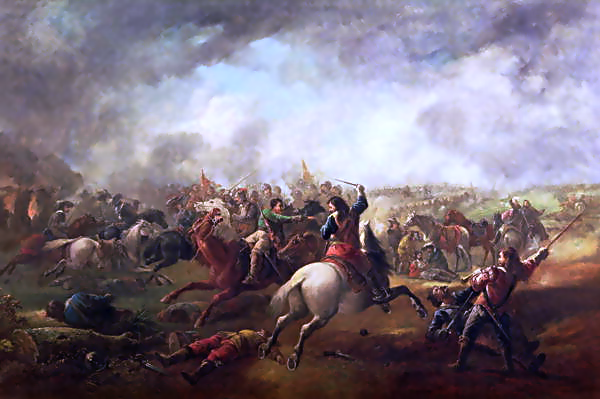The Battle of Marston Moor
The Battle of Marston Moor took place on 2 July 1644. Together with the Battle of Edgehill and the Battle of Naseby, it was one of the most significant conflicts of the First English Civil War. Parliament’s defeat of the Royalists severely dented Royalist power in northern England. The Battle is believed to be the largest ever fought on English soil.
On 1 July 1644, Prince Rupert, a Royalist commander, entered the city of York. This was an important Royalist success: the North had typically been in support of the Parliamentarians as they fiercely opposed Charles I’s forced loans. York was a wealthy religious cit, making it a key target during the war. When Rupert arrived at the city, the Parliamentarian force withdrew and made their way to Tadcaster.
The Royalists decided to pursue the withdrawing Parliamentarians. On 2 July, they caught up with most of the Parliamentarian force near Long Marston.

The Royalist faced several problems. Unlike the Parliamentarians, Prince Rupert was forced to command his men on the moor. This was because Parliament controlled the roads when the first Royalist units reached the Parliamentarians. His force also arrived in a scattered fashion because some took more time in their pursuit of the Parliamentarians. Parliament's force was therefore more disciplined, whereas Rupert had to marshall his men in a haphazard fashion as each soldier arrived on the battlefield. The Royalist force of 18,000 men was also outnumbered by 28,000 Parliamentarians.
Armies were traditionally organised with their horse regiments on the flanks of their infantry. The cavalry attacked first to try and dislodge the enemy’s position. However, at Marston Moor, Rupert had fewer than anticipated foot soldiers because Royalist foot regiments were arriving at Marston Moor one by one. Rupert was not able to make coherent battle plans because his army was limited at Marston Moor.
However, Rupert did hold an important advantage over Parliament. Despite the problems of marshalling troops on the moor, the moor’s geography provded his soldiers with plenty of protection. The moor had many scattered hedges and ditches: this meant that any attack was potentially extremely dangerous. Rupert’s left flank was especially well defended by musketeers who were sent to man the ditches.
The Royalist Lord John Byron presided over this well-protected left flank. Instead of staying in his position, Byron decided to launch an attack on the Parliamentary forces, led by Oliver Cromwell. This attack failed and enabled Cromwell to counterattack the Royalists’ left flank.
At first, the Royalist right flank, led by Lord George Goring,was successful. However, Lord George Goring could not keep up his attack and he was defeated by a force led by Cromwell and Fairfax.
As both flanks faces attack from all sides, the men in the middle of Rupert’s army fell into disarray. The Whitecoats finally arrived, led by the Duke of Newcastle, but they could not save the Royalists. At this point, the Royalists were fighting a losing battle.
The Battle of Marston Moor severely dented Royalist strength in the north. A few areas, like Scarborough and Bolton, held out after the battle, but Charles was forced to abandon his control of northern England.
How did the Royalists go from a decisive win at York to abject defeat at Marston Moor so quickly? The Royalists had been chasing an army that had left York in tatters. Rupert was a skilled leader, but Byron had foolishly abandoned his safe position in the moor’s ditches and left the Royalist left flank in a precarious position. However, the biggest reason for the Royalist defeat was probably the fact that Rupert was unable to coherently command his men. The Royalist pursuit was disorganised and there units’ late arrival did not help.
The battle confirmed how a well-equipped and trained army could win the war and established Cromwell’s reputation as a great commander. The Royalists effectively abandoned all control in the north of England. Although Prince Rupert lost his glowing reputation of invincibility in battle, Marston Moor made the reputation of another man; Oliver Cromwell made a name for himself for his role in defeating the Royalist cavalry.
See also: The Second Battle of Newbury
MLA Citation/Reference
"The Battle of Marston Moor". HistoryLearning.com. 2026. Web.
